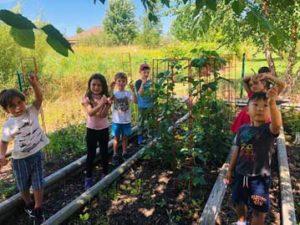
Enrolling your child in a summer camp program offers an extension of traditional learning with a setting outside the classroom. With more room to explore and learn, children may choose an activity like gardening to participate in. Gardening offers a lot of ways for children to learn and grow, both independently and as a group.
Learn about the benefits of gardening and the different elements a child will learn throughout the whole summer.
1. Motor Skills
Gardening is an ideal way for children to learn both fine and gross motor skills. Fine motor skills involve little movements with hands. Children will learn balance and control as they use small shovels to dig and handle small items like seeds.
Gross motor skills include bigger movements like pushing a wheelbarrow or moving bags of dirt around. Each element of gardening will improve the skills and can translate to other areas of life. Each day a child tends to the garden, they will improve on the skills and can learn how to utilize different tools.
For example, one day, a child may water the garden using a watering can or hose. The child will learn how to properly grip the items and learn some self-control in the process. Plants are very delicate, so with this understanding, children will focus on small movements and motor skills to keep steady and prevent issues.
2. Long-Term Goal Setting
For younger children, patience is often a challenge as they often expect instant results. In the world of gardening, children will learn the value of setting long-term goals and waiting for those goals to pay off. The long-term goals can apply to any plant like a blooming flower but really make a difference when growing fruit or vegetables.
A child can watch the progress of the food throughout the summer and learn to have patience as items like tomatoes or cucumbers ripen. This will all be worth it in the end when the items are picked and children see how much it was worth the wait.
To help showcase the progress, a summer class may use photos. Children can look back on the pictures and see how the plant has grown through the years.
3. Value of Food
Children often expect dinner on their plate without a question of where it came from. A gardening class will illuminate the process and showcase the life a farmer goes through to produce crops. Along with the plants in a summer camp garden, children can learn how food is resourced and gathered across the globe.
A gardening class presents an opportunity to learn about how different fruits and vegetables grow. Children can learn about foods that grow underground and ones that grow in trees. The learning can extend at home as families break down dinner elements and everyone learns where the foods come from.
Building a perspective of the world will help a child grow and prosper, along with building skills like empathy.
4. Teamwork
While gardening allows a child to work independently and grow skills on their own, the summer camp activity also includes a lot of teamwork. Children can help dig holes together, plan out the garden layout, and carry heavy items. Children will learn how to delegate the tasks and work together to make the garden thrive.
The teamwork element will also help build social skills. Communication is essential for a successful garden, and children are encouraged to talk through issues and work on problems. By the end of summer camp, children in the program will have a lot of growth and can use teamwork in other aspects of school, camp, or sports.
Contact us at Miniapple International Montessori School to find out more about our school-age summer camp program. Gardening is just one of many activities a child can partake in to learn and grow during the summer months.

